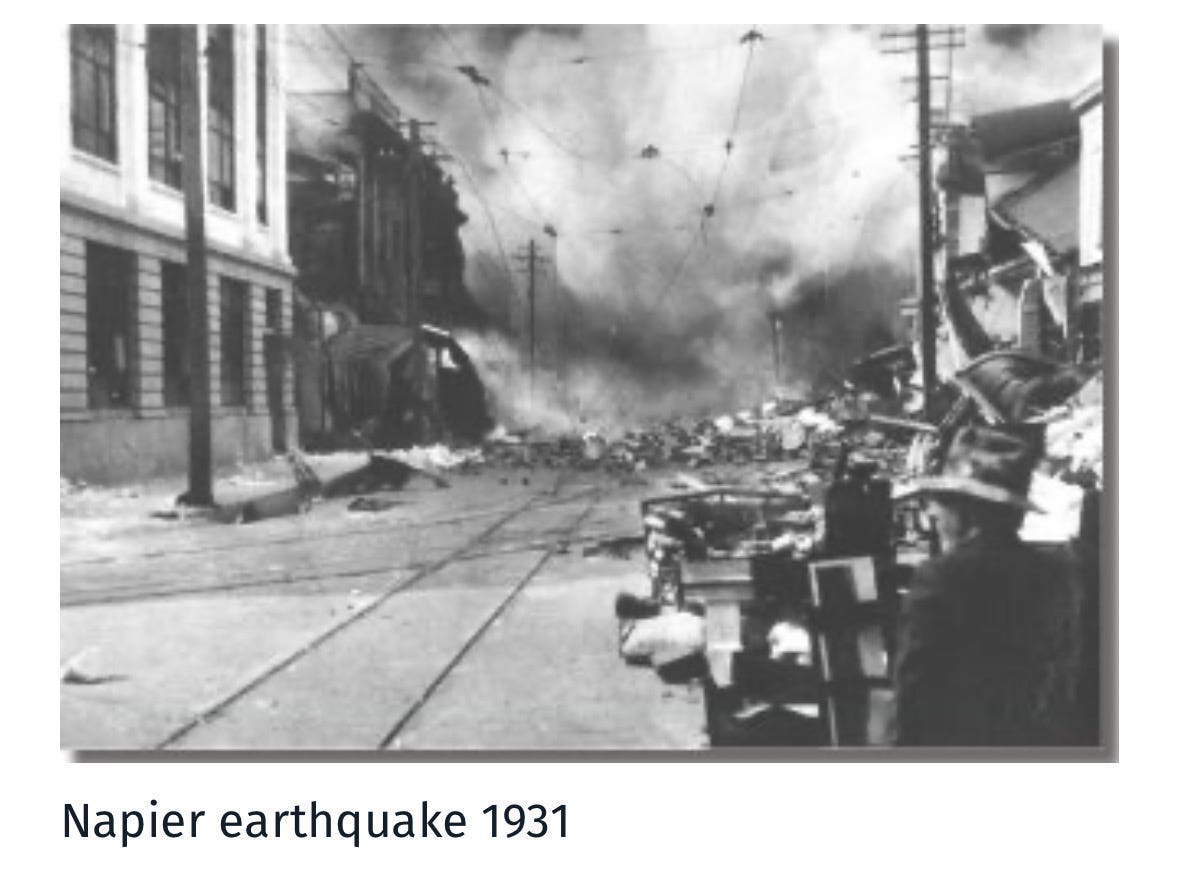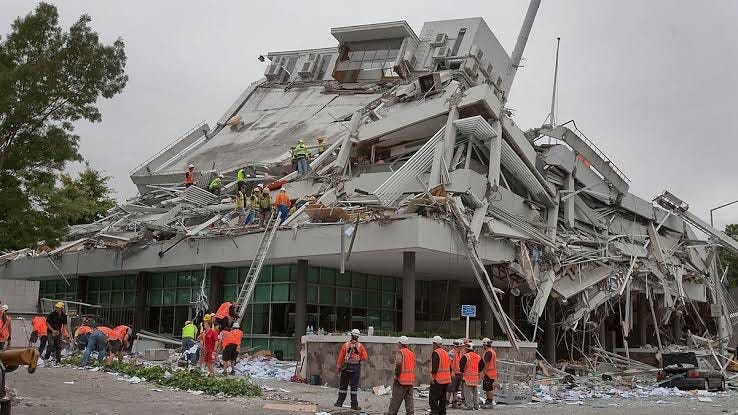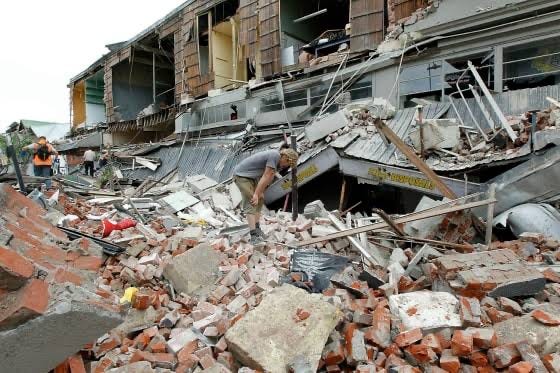Seymour’s Shaky Response To Earthquake Claims
Homeowners who sought help from Seymour outraged by his proposed solution.
Audio interview from RNZ with Community Board member Ali Jones.
If you don’t live in Christchurch, and haven’t for the past fifteen years, you probably have a different understanding of the words “EQC” to what we do. For most people, EQC is the scheme they don’t think about that much, except to remember that it used to play a lot of television ads showcasing now-incorrect advice about what to do during an earthquake. You may see some of your money and taxes going to them frequently in the form of levies. And you assume, particularly if you are a homeowner, that they are the insurance scheme you are paying into who will sort you out when The Big One hits.
Which it will. Statistically, it will. This is New Zealand. We sit on the edge of two tectonic plates. This is why we have a government-mandated earthquake insurance scheme. The people and the government both recognised earthquakes were inevitable for us, and that sooner or later, we would be hit with a whopping bill for them.
The history of the New Zealand insurance market is the antithesis to ACT: a timeline that demonstrates we’ve tried free market insurance and it doesn’t work out. That’s why we set up what this scheme started as: the War Damages Commission.
War insurance, when it was introduced, was the only compulsory insurance in New Zealand. While the New Zealand government had held life insurance schemes and fire insurance schemes in the past to bolster a market we found was not big enough to provide private insurance, this insurance scheme was different as it sought to provide property cover for entire regions, or even the entire country, in the event of large-scale death and destruction occurring.
In the 40s, war doubtless seemed the most likely use for that money. That was all it was set up to cover when it was established in 1941 (the same year that the Wellington Free Ambulance Act was passed!) — but the 1942 Wairarapa quakes quickly gave New Zealanders a different perspective on what this insurance should be used for, and in 1944, the War Damages Commission was replaced with the Earthquake and War Damages Commission.
War insurance was not dropped from the scheme until the 90s, and now in 2024, the Earthquake Commission has just been renamed the Natural Hazards Commission to recognise the increasing role it will play in insuring against weather events in a post-climate-change world. It bears the responsibility of protecting every home and land owner against the unforeseen — and also provides contents insurance for all us landless serfs in such events, for which we will all be very grateful should we ever need to use it.
It would be political suicide to mess with this, especially while the commission is embroiled in claims for multiple weather events that are progressing with a similar level of frustration to the Christchurch claims.
But that’s what David Seymour has chosen to do.
As a reminder, the first of the Christchurch Earthquakes was in 2010, and the second in 2011. That makes it fourteen years since the earthquakes, and I imagine that homeowners still dealing with EQC after all this time felt quite justified in going to to the press with their complaints about how long the process was taking. As they have with every government in the past.
Now, there’s a good reason for the delays people are facing. Some land damage doesn’t become evident until more than a decade later — for example, my aunt just had to pay for a guy to put a camera down her toilet so they could file for a fix that needs doing to the pipes beneath her house caused by the earthquakes that happened nearly 15 years before, but has only started causing problems now. It will probably cover a few thousand dollars worth of work if accepted, and it’s right that she shouldn’t be penalised for something Earthquake Insurance has legally covered but not investigated properly because they had to fix an entire city in a few years.
This was the compromise that was made for owners of any land suffering the long-term effects of the ground up and moving on them; there are stresses that are put on things like pipes and driveways that cause damage over time, cracks that didn’t become apparent for 3 years, or foundations that became uneven but aren’t picked up on until the house is sold 12 years later. This is a perfectly normal part of earthquake insurance, and we can’t fix those issues from day dot, nor do we want to pay to investigate fully all the potential covered damage on every property in the city. But when those issues do make themselves known, they will be covered.
Then there is the other major reason for the delays: bureaucracy. Engineering reports. Consents. Planning. Litigation. Disputes over how much should be paid by whom. Conversations that continue between an insurance company and their clients while claims remain unsettled, and those definitely do take time but is incredibly stressful spending 15 years dealing with that. These are things that the government can potentially speed up, and so governments are called on by Christchurch residents to do so at regular intervals.
But that was not the government response to frustrated homeowners asking the government to please help them. Instead, Deregulation Seymour has seized on the opportunity to “close a loophole”; he wants to time-limit all claims instead, and bar owners from compensation and repairs they are entitled to.
This is not just an injustice to over-cap homeowners in these negotiations, it is a threat to every piece of land in Christchurch, any one of which could have a nasty time-bomb hidden inside it still, and it is a threat to every kiwi homeowner who may in the future need cover for the natural disasters New Zealand is scheduled to be inundated with. Seymour is proposing a precedent where instead of helping people until everyone’s been helped, the government can hold out with unacceptable delays and then shirk their duty to compensate claimants by time-barring or cost-limiting their claims right at the end of the process.
Talk about undue incentive to settle.
This is, of course, the future that ACT want. Government-provided insurance? Pah! That’s a job for the free market.
Except it isn’t, and never has been, something the free market can be trusted with. State intervention for the insurance market has been needed in some form since back when New Zealand was still a dominion, and we are regularly reminded it’s still needed because insurers keep regularly under-insuring themselves, which they did in fact do in the Christchurch Earthquake. Another good reason why the Government needs to be a part of this conversation, and shoulder responsibility for it. EQC is necessary because of the timescales and scale of damage we are dealing with — companies come and go bust, but governments (hopefully) can hold their liability for a lot longer and won’t vanish from the market the moment there is a mass-payout event. And it’s important this is done because when there is a lack of insurance, we as a country take too long to recover from disasters if there is not the money to do so. This mandatory insurance that provides for and protects New Zealanders is necessary for the country to function as a whole.
In 1944, following three decades dominated by war, New Zealand said, “It’s neither right nor useful for people to have their lives wrecked beyond repair by one-off natural disasters.”
And here in 2024, David Seymour says, “Oh yes it is.”








Very good article Sapphi and like both the comments above too!
👍🏾💯👏🏾 Perfect explanation of the Christchurch EQ situation as it pertains to "hidden" damage & the legitimacy (until now?) for it being covered. I was "lucky" in that I was renting at the time so my landlord(s) have had to deal with the major stress, although it was pretty stressful being ejected from my home - 1st by the EQ's themselves, then by the landlord not allowing a return to retrieve possessions (mind you, as the high-rise had to eventually be demolished for safety reasons, they were right to only allow limited access with structural engineers going in first & standing by for the duration - I guess to explain why the building was collapsing underneath us during an after-shock?🤷🏾♀️) And then finding a semi-munted house that got plumbing restored & was cheap to rent until I returned to being a home owner with the ability to buy a house that had withstood everything with only minor cracks - AS FAR AS WE KNOW! I think it is fine, as the land under didn't move much & didn't liquefy at all, but my immediate neighbours still had major repairs years later, so I always keep my 🤞🏽that nothing will emerge down the line that will cost for essential remediation. I know people who have/still are living with the stress of getting legitimate claims & repairs carried out - See-less is a total loss as a "representative" of anyone but his warped mind & his "friends" with warped minds as to democracy & their vested interests in having an oligarchy run Aotearoa 🤢🤬